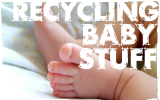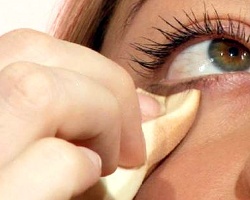 We’ve had an email from Charley:
We’ve had an email from Charley:
I’ve read your pages about reducing toilet paper and sanitary towels. I’m not sure I want to go that far yet but I do want to find an alternative for makeup sponges like for applying liquid foundation. Do you know if there are any recycled sponges on the market or what else can I use?
I’m hoping we’ve got some make-up experts in the Recycle This community — I’ve only worn foundation twice in my entire life so I don’t know much about that sort of thing. It’s an evasive answer but that is one way to reduce using synthetic sponges/foam pads – and other make-up consumables such as packaging: wear less make-up and less regularly. I realise it’s not an answer for everyone but it is something to consider. I think I used to wear make-up out of habit but once I got over the shock of going cosmetically nude, I quickly normalised to not wearing make-up.
Now to Charley’s actual question: with Google, I can find sponge scourers make from recycled but not finer make-up sponges. Anyone got better Google skills or with more cosmetics knowledge, know where/what to look for? You can get natural sponges for applying make-up (which could be composted at the end of the life) but they usually have their own environmental impact. Anyone got any advice on those?
Alternatives: again, possibly not for everyone but switch to a powder foundation that can be applied with a brush – a good quality brush washed regularly will last a long, long time. (On a similar point, I can’t believe I stuck with sponge eye shadow applicators for so long — trained into them by the “free” ones with some shadows I guess — when a shaped brush does a far better job and lasts a lot longer too.)
I know a lot of people make their own make-up removal pads to use instead of cotton wool but has anyone made their own reusable application pads?
Any other suggestions or ideas for Charley to try?
Categories: bathroom, reduce this
Posted by louisa
on 27 October 2011
 Several bloggers I follow take part in the “Food Waste Friday” meme, in which they post pictures of their food waste from the week and a few have featured the same thing over the last few weeks: floppy celery.
Several bloggers I follow take part in the “Food Waste Friday” meme, in which they post pictures of their food waste from the week and a few have featured the same thing over the last few weeks: floppy celery.
We don’t eat celery here very often (because my boyfriend John has … issues with it) but if it looks like I’m not going to eat it all before the floppy stage kicks in, I slice it into small rounds and freeze it to include in the mix next time I’m making stock. If John didn’t have his issues with it, I’d probably be happy to include no longer crisp celery in a stew/casserole – since it’ll soften up during cooking anyway. (I don’t tell him about putting it in stock, ssssh, don’t tell him!)
There is some debate on whether/how it should be fed to chickens – some people advocate chopping it up first so the “strings” don’t get caught in the chicken’s crop, others say they enjoy the challenge of breaking it up themselves. The similar yes/no debate seems to exist for rabbits and other small furry pets – just because like with people, some animals like it more than others – but all advocate that it should just be used as a treat in addition to other food, not in large quantities.
A good few people around the ol’ interweb also say you can revive soggy celery by leave it to stand in some ice water for a while – or more effectively, slice into smaller sticks and float them in a bowl of the same.
(If it’s too far gone for reviving or even cooking, it can, of course, be composted.)
What do you do with floppy celery sticks?
Categories: food, items
Posted by louisa
on 26 October 2011
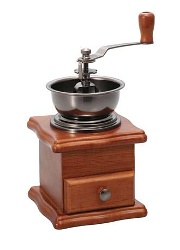 We’ve had an email from good friend of Recycle This Petra:
We’ve had an email from good friend of Recycle This Petra:
When cleaning some cupboards, I found an old hand coffee mill. I never use it for coffee beans, but could you think of another purpose for this mill. Something to grind for kitchen use? Or something totally different?
All ideas are welcome.
My ex had a very basic hand grinder for coffee and it took *forever* to grind enough beans for a single cup of coffee so if it’s anything like that one, I wouldn’t advocate using it to grind any large quantities of things or anything that needs to be very fine. I suspect more modern/expensive grinders are more efficient though and probably give more control over the final ground size – I’ve never tried it but could they be used for making rice flour or chickpea (gram) flour?
(If you’re not going to make use of it, the usual “pass it on” rule & routes apply: someone might want it for grinding coffee. I regularly see this type of thing on the “household” shelves of local charity/thrift shops or at car boot sales etc – they’re often sold without original packaging/instructions as long as they’re in good, clean condition.)
Any other suggestions for things to grind in it aside from coffee? Or other reuses/recycling ideas?
Categories: household, items, kitchen
Posted by louisa
on 24 October 2011
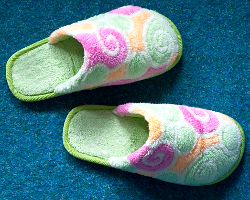 Rachael left a note on the suggestions page, asking:
Rachael left a note on the suggestions page, asking:
hi, how can recycle some slippers? do shoe banks take them? thanks
Yes, they can be put into shoe banks – but make sure they’re tied together in some way (if they’ve not got laces, tie them together with string or an elastic band). Stuff put in charity shoe banks is usually distributed in three ways depending on quality/condition: for resale at a charity shop in this country, for resale overseas or for actual recycling down to being shredded for raw materials — so one way or another, they’ll get reused.
If they’re old and in poor condition, you might be able to revamp them yourself to get a bit longer out of them – I tend to wear slipper socks than actual slippers but I’ve upcycled the “leather” soles of one pair by crocheting new “uppers” using the relevant part of patterns widely available on the internet. Sole aside, a lot of towelling-type slippers will be 100% (or thereabouts) cotton so might be dye-able, which might breathe new life into a discoloured/grubby pale coloured pair.
Any other ideas for revamping or recycling an old pair of slippers? Or other suggestions on places to pass them onto? (eg would shelters take them?)
Categories: clothes and fabric, household, items
Posted by louisa
on 19 October 2011
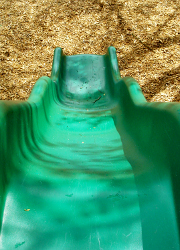 Sherri emailed to ask:
Sherri emailed to ask:
Any ideas on using an old kids slide in the veggie garden?
I like that she added the “in the veggie garden” bit because that’s nearly always where my mind goes first and I worry that I come off as a bit obsessed with growing in random recycled things! ;)
I’m presuming that the slide is made from formed plastic – as that seems to be the thing for garden slides these days – but the ladder section might be chunky plastic or more slender metal, depending on the size of the slide. Either way, they could be used to add height to a veg garden such as providing supports for climbers or for vertical gardening — propped up against a wall, chunky plastic ladders might be suitable for use as a ladder planter (ideal for small pots of herbs and/or salad leaves) or hanging baskets etc could be hooked onto a metal ladder with thin rungs.
Depending on the shape of the slide section, it might be suitable to use in a few different ways in a veg garden – if it’s flat (rather than wavy/bumpy or overly shaped at the top & bottom), it could be used as a water-catching trough underneath pots/containers or adapted into a potting bench type thing (the sides of the slide would stop surplus soil going all over the place … I’m a messy gardener with a soil shortage so this sort of thing would be very beneficial for me!).
Any other veg growing/gardening suggestions?
What about other ideas for reuses or recycling ideas for such a slide?
Categories: garden, items
Posted by louisa
on 17 October 2011
 We’ve had an email from Charley:
We’ve had an email from Charley:


 Several bloggers I follow take part in the “Food Waste Friday” meme, in which they post pictures of their food waste from the week and a few have featured the same thing over the last few weeks: floppy celery.
Several bloggers I follow take part in the “Food Waste Friday” meme, in which they post pictures of their food waste from the week and a few have featured the same thing over the last few weeks: floppy celery. We’ve had an email from good friend of Recycle This Petra:
We’ve had an email from good friend of Recycle This Petra: Rachael left a note on the suggestions page, asking:
Rachael left a note on the suggestions page, asking: Sherri emailed to ask:
Sherri emailed to ask: